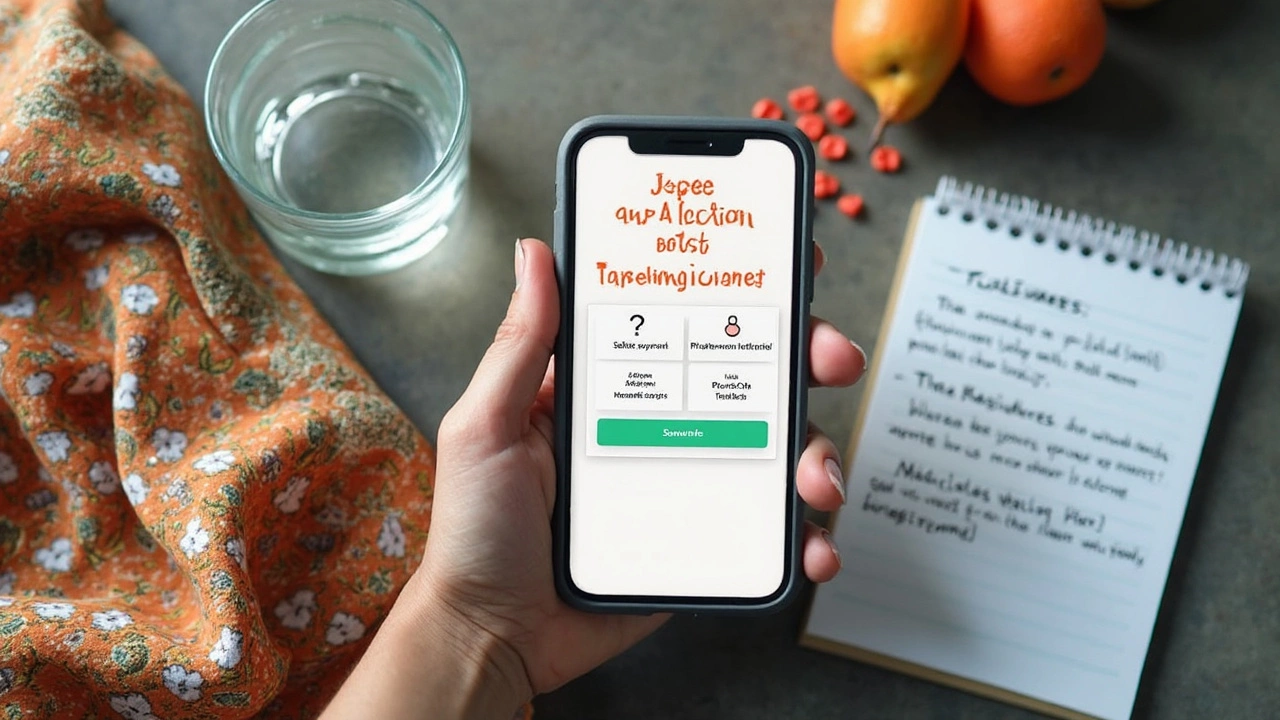If you’re scared of needles, you’ve probably wondered—can I just take Ozempic as a pill? With all the buzz around Ozempic and similar weight-loss shots, it’s the first question that comes up for a lot of people in weight loss clinics—not just my buddies, but everyone from gym-goers to regular folks just tired of injectables.
Here’s the short answer: the original Ozempic, the one you keep hearing about on TikTok and at the pharmacy, only comes as a weekly injection. But hold up, there is an oral version of the main ingredient (semaglutide) approved for diabetes. The trick is, it’s called Rybelsus when it’s in pill form—not Ozempic—and it’s only approved for type 2 diabetes, not for weight loss yet. That loophole trips up a lot of people who walk into weight loss clinics hoping for a no-needle option.
- Why Everyone Wants an Ozempic Pill
- Ozempic Shots vs. Pills: What’s Real?
- Meet Oral Semaglutide: The Pill Version’s Story
- Getting Started: What to Ask at Your Clinic
- Tips for Sticking to Weight Loss Meds
Why Everyone Wants an Ozempic Pill
No one really loves giving themselves a shot, especially when it’s for weight loss. That’s why so many folks ask about an Ozempic pill instead of the injection. Dealing with needles can be stressful, time-consuming, and sometimes a pain to fit into your routine. Plus, for a bunch of people, it’s just downright scary. The idea of something as simple as popping a pill every morning? Way easier to stick to, and honestly, way less nerve-wracking.
Here’s something most people don’t realize: studies say about 28% of adults have a real fear of needles. That’s a big chunk of patients who might avoid getting help just because of the delivery method. And weight loss clinics see folks who want quick, simple solutions—they’re busy, or they travel a lot, or they just want something private they can do at home without a fuss.
Check out how pill vs. injection preferences stack up in a recent survey:
| Delivery Method | Percentage Preferring |
|---|---|
| Pill (oral) | 67% |
| Injection | 19% |
| No preference | 14% |
It’s not just about convenience, either. Pills feel a little more "normal." You take medicine every day anyway, right? So why should weight loss meds be any different? That’s what makes the idea so appealing. To be honest, my wife Anjali was pretty blunt—she said if there’s ever a pill version, she’d be first in line, because needles just aren’t her thing at all.
If you’re dealing with travel, kids, crazy schedules, or just want to keep your health stuff private, the search for a Ozempic pill makes total sense. That’s why weight loss clinics and doctors are hearing this request all the time now. Everyone wants fast, easy, and fuss-free—especially with something as personal as losing weight.
Ozempic Shots vs. Pills: What’s Real?
This is where things usually get confusing, so let’s clear it up. The Ozempic brand itself only comes as a weekly injection. You inject it under your skin with a pre-filled pen that you keep in your fridge. That’s what clinics, pharmacies, and even celebrities are using when they say they're "on Ozempic." There's no official "Ozempic pill" you can pop every morning, at least not in the U.S. as of June 2025.
But there’s a curveball: the same main ingredient in Ozempic—semaglutide—does have a pill version called Rybelsus. Rybelsus is an oral tablet, taken once a day, but it’s FDA-approved only for type 2 diabetes, not for weight loss. Some doctors might prescribe it "off-label" for folks aiming to lose weight, but your insurance might not cover that use. Here’s a quick comparison to show how injections and pills stack up:
| Feature | Injection (Ozempic) | Pill (Rybelsus) |
|---|---|---|
| How you take it | Weekly shot | Daily pill |
| FDA-Approved for Weight Loss? | No, but prescribed off-label | No (for diabetes only) |
| Active Ingredient | Semaglutide | Semaglutide |
| Dosing Style | Prefilled injector pen | Tablet you swallow with water and empty stomach |
| Typical Starting Dose | 0.25 mg/week | 3 mg/day |
Some people love the injection because it’s once a week—set a reminder on your phone, and you’re done. Not a daily commitment. On the flip side, the pill seems easier at first glance, but you’ve got to take it first thing every morning, with a plain glass of water, before eating or drinking anything. If you mess that up, it doesn’t work as well. It’s a little fussy.
Basically, if you’re thinking about weight loss, clinics will offer you the injectable version. If you really hate needles, you can ask about oral options, but be ready for a different routine and possibly some insurance headaches. Don’t get pulled in by rumors or TikTok hacks—the facts are pretty simple once you lay them out. For now, the shot is what people mean when they say "Ozempic for weight loss."

Meet Oral Semaglutide: The Pill Version’s Story
So, let’s clear up some confusion first. Ozempic pill isn’t a thing—at least not by that name. The pill form of semaglutide is called Rybelsus. Both drugs use the same active ingredient, just in different formats. Ozempic is the weekly injection everyone’s talking about for diabetes and now for weight loss, while Rybelsus comes as a daily tablet and is only officially approved to treat type 2 diabetes.
Why do these meds have different names for what’s basically the same stuff? It comes down to the studies and FDA approvals. Ozempic (shot) got the green light first, for type 2 diabetes and later for weight loss (as Wegovy, which is just a higher dose). Rybelsus (pill) was tested just for diabetes—not weight loss. That's why doctors can give you Rybelsus off-label for weight, but it's not yet common practice at most weight loss clinics.
Here’s a quick comparison that clears things up:
| Brand | Form | FDA Approved For | Dosing |
|---|---|---|---|
| Ozempic | Injection | Type 2 Diabetes, Weight Loss (as Wegovy) | Once Weekly |
| Rybelsus | Pill | Type 2 Diabetes | Once Daily |
| Wegovy | Injection | Weight Loss | Once Weekly, Higher Dose |
If you’re thinking about getting Rybelsus for weight loss, a few things matter. First, you’ll need to take it every day—not just once a week. Also, you have to follow some weird rules: you take it first thing in the morning, no food or other meds for at least 30 minutes. Forget and you might mess up the way your body absorbs it. That alone makes clinic nurses groan, since it’s hard for people to remember that routine day after day.
Now, you might wonder if the pill works as well for weight loss as the shot. Some early research shows Rybelsus helps people lose weight, but on average, folks drop less than they do with Ozempic or Wegovy. Why? The dose of semaglutide you get from the pill can’t safely go as high as the shot, so the effects are a bit milder. Plus, tons of people have stomach side effects (like nausea or upset stomach), which sometimes makes staying with the medication tough and pushes people back to the injection forms.
If you’re hoping to ditch the needle, keep an eye on new studies. Drug companies are working on higher-dose semaglutide pills for weight loss, so a true Ozempic pill for weight loss may hit clinics someday, but as of now, it’s just not here yet.
Getting Started: What to Ask at Your Clinic
Walking into a weight loss clinic? Get straight to the point with your questions. If you’re interested in an Ozempic pill, be upfront. Tell your doctor about your needle concerns and mention if you’ve heard of Rybelsus (the oral semaglutide). Even though Rybelsus isn’t officially approved for weight loss like the Ozempic pill everyone wishes for, some clinics might discuss off-label uses depending on your health history.
Here’s what you should ask before agreeing to any treatment:
- Which versions of semaglutide are available here? (Pills, shots, or both?)
- Do you prescribe oral semaglutide (Rybelsus), and why or why not?
- Is there any difference in weight loss results between the pill and the shot?
- What side effects should I expect with each option?
- How will my insurance handle the cost? Will my plan cover Rybelsus or Ozempic?
- Do you monitor progress differently for pills versus injections?
- Are there any newer oral weight loss meds I should know about?
Bring up your past treatments and any health issues like kidney or stomach problems—these might change which medication is safest for you. Also, ask about lifestyle support. A good clinic will offer advice beyond just writing a prescription. If the clinic only pushes shots without listening, find another place that actually cares about your needs. You’re paying for expertise—don’t settle.

Tips for Sticking to Weight Loss Meds
Actually taking your weight loss meds on schedule is a bigger deal than most people think. Whether you’re on the classic Ozempic shot or trying to convince your doc to give you the Rybelsus pill, missing doses can mess with your results. Studies show missing just one dose of semaglutide can make your blood sugar and appetite spike back up, so staying on track is key.
Here’s a table breaking down how folks tend to stick (or not stick) with meds like these, based on clinic surveys and published data:
| Medication Adherence Rate (First 6 Months) | Common Issue for Missing Doses |
|---|---|
| Ozempic (injection): 78% | Forgetting weekly shot |
| Rybelsus (pill): 61% | Missing morning routine with water/empty stomach |
If you’re serious about losing weight, a couple of tricks can make it so much easier to stay consistent. Here’s what works for real people:
- Ozempic pill or shot, pick a reminder system—digital or old school. Set an alarm on your phone or stick a Post-it on your fridge.
- For pills like Rybelsus, it has to be taken first thing in the morning, on an empty stomach, with just a sip of water—then wait at least 30 minutes before eating or drinking anything. Sounds annoying, but once you link it to a habit (like brushing your teeth), it feels automatic.
- If you travel or have weird work hours, pack your meds the night before—don’t leave it to chance. I keep travel-size pill holders and extra sharps containers in my bag just in case.
- Don’t beat yourself up if you slip up. Even the data says most people miss at least one dose a year. Just get back on track the next day—consistency is the long game.
- Track your progress and side effects in a journal or app. Even quick notes help you see what’s working (and what’s not), and make it easier to talk to your clinic staff about real-life problems.
If you’re using a weight loss clinic, ask their staff for tips or accountability check-ins. Some offer automated reminders if you sign up for them, or even have nurse coaches who will text you. Trust me, a little nudge goes a long way—almost as much as the medication itself.
